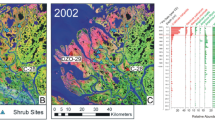Abstract
As part of its Assessment Reports (ARs), the Intergovernmental Panel on Climate Change (IPCC) publishes Summaries for Policymakers (SPMs) that review key findings on climate science and climate change’s potential impacts. We argue that the IPCC could create more engaging SPMs by incorporating narrative features. This project evaluates AR5’s SPM for narrative opportunities, which are elements that could be narratively restructured or strengthened. Storytelling does not compromise the goals of the IPCC but rather helps public audiences understand and relate to the information. We encourage the adoption of storytelling elements to increase public understanding of and engagement with climate science.
Similar content being viewed by others
References
Barkemeyer R, Dessai S, Monge-Sanz B, Renzi BG, Napolitano G (2016) Linguistic analysis of IPCC summaries for policymakers and associated coverage. Nat Clim Chang 6(3):311–316
Blastland M, Alexandra L, Freeman J, van der Linden S, Marteau TM, Spiegelhalter D (2020) Five rules for evidence communication. Nature 587(7834):362–364
Bloomfield EF (2019) Communication strategies for engaging climate skeptics: religion and the environment. Routledge
Bloomfield EF, Sangalang A (2014) Juxtaposition as visual argument: health rhetoric in super size me and fat head. Argum Advocacy 50(3):141–156
Boyd RL, Blackburn KG, Pennebaker JW (2020) The narrative arc: revealing core narrative structures through text analysis. Sci Adv 6(32):1–9
Bray D, von Storch H (2009) ‘Prediction’ or ‘projection’?: the nomenclature of climate science. Sci Commun 30(4):534–543
Brundtland G (1987) Report of the World Commission on Environment and Development: Our Common Future. United Nations
Climate Outreach (2018) Communications Handbook for IPCC Scientists. Retrieved from /climateoutreach.org/reports/ipcc-communications-handbook
Dahlstrom MF (2014) Using narratives and storytelling to communicate science with nonexpert audiences. Proc Natl Acad Sci 111(4):13614–13620
Fagan M, Huang C (2019) A look at how people around the world view climate change. Pew Research Center. Retrieved from /www.pewresearch.org/fact-tank/2019/04/18/a-look-at-how-people-around-the-world-view-climate-change/
Fahnestock J (1986) Accommodating science: the rhetorical life of scientific facts. Writ Commun 15(3):330–350
Fisher WR (1984) Narration as a human communication paradigm: the case of public moral argument. Commun Monogr 51(1):1–22
Gustafson A, Ballew MT, Goldberg MH, Cutler MJ, Rosenthal SA, Leiserowitz A (2020) Personal stories can shift climate change beliefs and risk perceptions. Commun Rep 33(3):121–135
Guy S, Kashima Y, Walker I, O’Neill S (2013) Comparing the atmosphere to a bathtub: effectiveness of analogy for reasoning about accumulation. Clim Chang 121(4):579–594
Harold J, Lorenzoni I, Shipley TF, Coventry KR (2020) Communication of IPCC visuals: IPCC authors’ views and assessments of visual complexity. Clim Chang 158(2):255–270
Intergovernmental Panel on Climate Change (2014a) Climate Change 2014 Synthesis Report
Intergovernmental Panel on Climate Change (2014b) Summary for Policymakers
Johnson Q, Jessie M, Sangalang A, Park S-Y (2021) First-person, third-person, or bystander? Exploring the persuasive influence of perspective in mental health narratives. J Health Commun 26(4):225–238
Jones MD, Peterson H (2017) Narrative persuasion and storytelling as climate communication strategies. Oxford Research Encyclopedia of Climate Science https://doi.org/10.1093/acrefore/9780190228620.013.384
Kim J, Nan X (2016) Temporal framing effects differ for narrative versus non-narrative messages: the case of promoting HPV vaccination. Commun Res 46(3):401–417
Leiserowitz A, Maibach E, Rosenthal S, Kotcher J, Bergquist P, Ballew M, Goldberg M, Gustafson A, Wang X (2020) Climate change in the American mind: April 2020. Yale Program on Climate Change Communication
Martinez-Conde S, Macknik SL (2017) Opinion: finding the plot in science storytelling in hopes of enhancing science communication. PNAS 114(31):8127–8129
McComas K, Shanahan J (1999) Telling stories about global climate change: measuring the impact of narratives on issue cycles. Commun Res 26(1):30–57
Morris BS, Chrysochou P, Christensen JD, Orquin JL, Barraza J, Zak PJ, Mitkidis P (2019) Stories vs. facts: triggering emotion and action-taking on climate change. Clim Chang 154(1):19–36
Poortvliet PM, Niles MT, Veraart JA, Werners SE, Korporaal FC, Mulder BC (2020) Communicating climate change risk: a content analysis of IPCC’s summary for policymakers. Sustainability 12(4861):1–14
Sangalang A, Bloomfield EF (2018) Mother goose and mother nature: designing stories to communicate information about climate change. Commun Stud 69(5):583–604
Stocker TF, Plattner G-K (2016) Making use of the IPCC’s powerful communication tool. Nat Clim Chang 6(7):637–638
Walsh L (2013) Scientists as prophets: a rhetorical genealogy. Oxford University Press
Walsh L (2017) Understanding the rhetoric of climate science debates. WIREs Clim Chang 8(3):1–7
Wardekker A, Lorenz S (2019) The visual framing of climate change impacts and adaptation in the IPCC Assessment Reports. Clim Chang 156(1):273–292
Availability of data and materials
Data sharing not applicable to this article as no datasets were generated or analysed during the current study.
Author information
Authors and Affiliations
Contributions
All authors contributed to the paper conception and writing. The first draft of the theory, framework, and introduction of the article were written by EFB. The first draft of the narrative opportunities sections was written by CM. Both EFB and CM revised and edited the paper.
Corresponding author
Ethics declarations
Ethics approval
Not applicable.
Consent to participate
Not applicable.
Consent for publication
Not applicable.
Competing interests
The authors declare no competing interests.
Additional information
Publisher’s note
Springer Nature remains neutral with regard to jurisdictional claims in published maps and institutional affiliations.
This article is part of the topical collection “Climate Change Communication and the IPCC”, edited by Saffron O'Neill and Roz Pidcock
Rights and permissions
About this article
Cite this article
Bloomfield, E.F., Manktelow, C. Climate communication and storytelling. Climatic Change 167, 34 (2021). https://doi.org/10.1007/s10584-021-03199-6
Received:
Accepted:
Published:
DOI: https://doi.org/10.1007/s10584-021-03199-6




